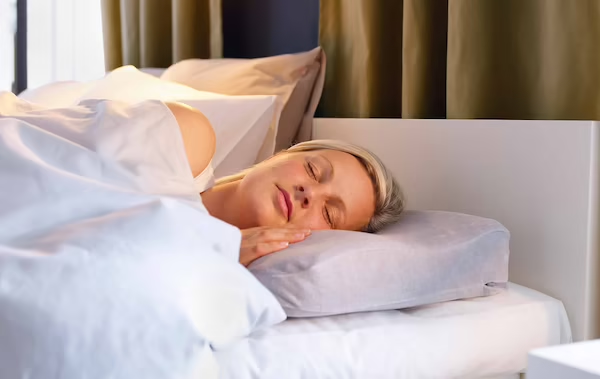When the temperature rises, the immediate solution for many is to switch on a fan, especially when it’s time to sleep. While fans can provide quick relief from the heat, they may not be the ideal option for everyone. According to research, sleeping with a fan on can pose several health risks that are often overlooked. Before you rely on your fan to keep cool at night, it’s essential to understand the potential drawbacks and how to mitigate them.

Image Credit: Pexels
Health Risks of Sleeping with a Fan
Fans can be a double-edged sword when it comes to sleep. While they offer a much-needed breeze during hot nights, they can also introduce a range of health concerns. The Sleep Advisor has highlighted four key reasons why fans might not be the best choice for everyone.
Allergic Reactions
One of the primary concerns with using a fan while sleeping is the potential for allergic reactions. Fans can stir up dust, pollen, and other allergens, making them airborne. For individuals with allergies or asthma, this can exacerbate symptoms, leading to discomfort and disturbed sleep. To mitigate this issue, it’s crucial to regularly clean both your fan and your room to reduce the presence of allergens.
Dry Air
Another downside of sleeping with a fan is the dry air it circulates. Constant air movement can dry out your skin, eyes, and mouth, particularly for those who sleep with their mouths or eyes open. This dryness can lead to irritation and discomfort, making it harder to achieve a restful sleep. To combat this, keep a glass of water by your bedside and consider using an eye cover to protect against the drying effects of the fan.
Sinus Irritation
Continuous exposure to cool air from a fan can dry out your sinuses, leading to irritation and an overproduction of mucus. This can result in headaches, nasal congestion, and a general feeling of discomfort. If you’re prone to sinus issues, it may be worth reconsidering the use of a fan at night or finding alternative ways to keep cool.

Image Credit: Pexels
Sore Muscles
Direct exposure to fan air can cause muscle stiffness or cramps, especially if you prefer having the air blowing directly on you throughout the night. This is particularly problematic for those who already experience muscle pain or stiffness. Adjusting the fan’s position or using a timer to limit its operation during the night can help alleviate this issue.
The Benefits of Sleeping in a Cold Room
While there are risks associated with using a fan, there’s no denying the benefits of sleeping in a cooler environment. Science suggests that maintaining a lower room temperature can improve overall health, particularly in areas such as insomnia, weight management, and stress reduction.

Image Credit: Pexels
Combatting Insomnia
Insomnia has various causes, and difficulty regulating body temperature is a significant one. A cooler room helps regulate your body temperature, promoting faster and deeper sleep. Lower temperatures signal your body to relax and enter a sleep state, while higher temperatures tend to keep you alert and awake.
Aiding Weight Loss and Reducing Diabetes Risk
Research indicates that sleeping in a room around 66 degrees Fahrenheit can boost metabolism and improve insulin resistance, lowering the risk of diabetes and aiding in weight loss. Cooler environments can increase brown fat, which helps burn calories and improve metabolism, making a cool room beneficial for more than just a good night’s sleep.
Anti-Aging and Stress Reduction

Image Credit: Pexels
Sleeping in a cold room can also promote the production of melatonin, an anti-aging hormone. Additionally, cooler temperatures reduce stress and depression by promoting restful sleep, free from the discomfort of overheating and frequent tossing and turning.
How to Maintain a Cool Sleeping Environment
If you rely on a fan to keep cool at night but are concerned about the potential health risks, there are several other strategies you can use to maintain a comfortable sleeping environment.
Programmable Thermostat
Investing in a programmable thermostat allows you to maintain optimal temperatures when you’re home or away, ensuring your bedroom is always at the right temperature for sleep. This can be a more effective and less risky way to stay cool than relying on a fan.
Sleep Naked
Sleeping without pajamas allows your skin to breathe and stay cooler, promoting healthier skin and reducing sweat. It’s a simple and natural way to keep your body temperature down during the night.
Freeze Bedding

Image Credit: Pexels
Placing your sheets or pillowcases in the freezer before bedtime might sound unusual, but it can be a refreshing solution on particularly hot nights. This trick can provide instant coolness as you settle in for sleep.
Feet Out
Exposing your feet from under the covers can help regulate your body temperature and release excess heat. This small adjustment can make a big difference in your overall comfort during the night.
Quality Bedding
Investing in breathable cotton bedding rather than synthetic materials like polyester can help keep you cooler. Organic mattresses and pillows can also contribute to a more comfortable and cooler sleeping environment.
Layered Bedding
Layering your bedding allows you to easily adjust your comfort level by adding or removing blankets throughout the night. This flexibility ensures that you can maintain the ideal temperature without relying solely on a fan.
Achieving the Perfect Sleep Temperature

A room temperature between 60 and 67 degrees Fahrenheit is considered ideal for a restful night’s sleep. By adjusting your sleeping environment, you can enjoy the benefits of reduced insomnia, improved weight management, and overall better health. Whether you opt for a fan, a thermostat adjustment, or a combination of both, cooler temperatures can make a significant difference in the quality of your sleep.
Embracing a Cooler Night’s Sleep
Embracing a cooler night’s sleep is about more than just comfort—it’s a step toward better health and well-being. By making small adjustments, such as using breathable fabrics, managing room temperature, and understanding your body’s needs, you can transform your sleeping experience.
Whether it’s through the soothing hum of a fan, the gentle chill of cotton sheets, or the refreshing coolness of a well-ventilated room, finding the right balance can lead to more restorative sleep. As you explore these methods, remember that the key is to listen to your body’s signals and adapt your environment to support a healthy, rejuvenating rest. In doing so, you’ll unlock the full potential of sleep, enhancing your overall quality of life.
Sleeping with a fan may seem like a quick fix to beat the heat, but it comes with a range of health risks that are often overlooked. From allergic reactions and dry air to sinus irritation and sore muscles, the drawbacks of using a fan at night can outweigh the benefits. By understanding the science behind the ideal sleeping temperature and exploring alternative cooling strategies, you can create a sleep environment that promotes better health, deeper sleep, and an overall improved quality of life. Remember, a cooler night’s sleep is not just about comfort—it’s a investment in your long-term well-being.


